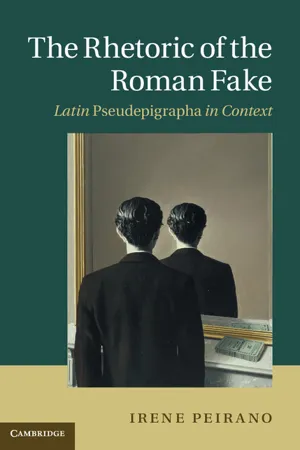
- English
- PDF
- Available on iOS & Android
About this book
Previous scholarship on classical pseudepigrapha has generally aimed at proving issues of attribution and dating of individual works, with little or no attention paid to the texts as literary artefacts. Instead, this book looks at Latin fakes as sophisticated products of a literary culture in which collaborative practices of supplementation, recasting and role-play were the absolute cornerstones of rhetorical education and literary practice. Texts such as the Catalepton, the Consolatio ad Liviam and the Panegyricus Messallae thus illuminate the strategies whereby Imperial audiences received and interrogated canonical texts and are here explored as key moments in the Imperial reception of Augustan authors such as Virgil, Ovid and Tibullus. The study of the rhetoric of these creative supplements irreverently mingling truth and fiction reveals much not only about the neighbouring concepts of fiction, authenticity and reality, but also about the tacit assumptions by which the latter are employed in literary criticism.
Frequently asked questions
- Essential is ideal for learners and professionals who enjoy exploring a wide range of subjects. Access the Essential Library with 800,000+ trusted titles and best-sellers across business, personal growth, and the humanities. Includes unlimited reading time and Standard Read Aloud voice.
- Complete: Perfect for advanced learners and researchers needing full, unrestricted access. Unlock 1.4M+ books across hundreds of subjects, including academic and specialized titles. The Complete Plan also includes advanced features like Premium Read Aloud and Research Assistant.
Please note we cannot support devices running on iOS 13 and Android 7 or earlier. Learn more about using the app.
Information
Table of contents
- Cover
- THE RHETORIC OF THE ROMAN FAKE
- Title
- Copyright
- Contents
- Acknowledgments
- List of abbreviations
- Introduction
- CHAPTER 1 Literary fakes and their ancient reception
- CHAPTER 2 Constructing the young Virgil: The Catalepton as pseudepigraphic literature
- CHAPTER 3 Poets and patrons: Catalepton 9, the Panegyricus Messallae, the Laus Pisonis, and the pseudo-panegyric
- CHAPTER 4 Prefiguring Virgil: The Ciris
- CHAPTER 5 Recreating the past: The Consolatio ad Liviam and Elegiae in Maecenatem
- Epilogue: Towards a rhetoric of the Roman fake – the Helen episode in Aeneid 2
- Selected editions and commentaries of Latin texts discussed in the book
- Bibliography
- Subject index
- Index locorum